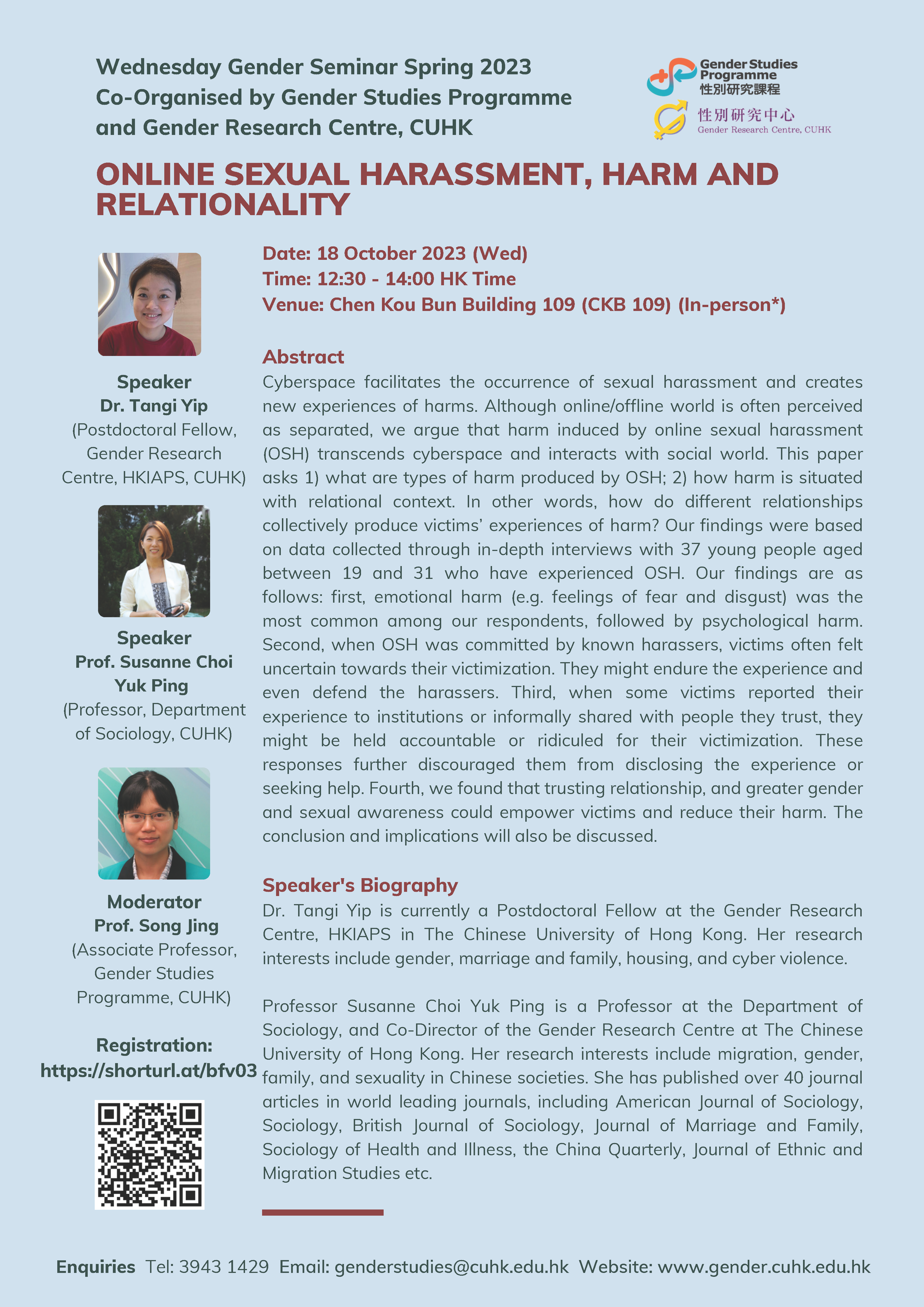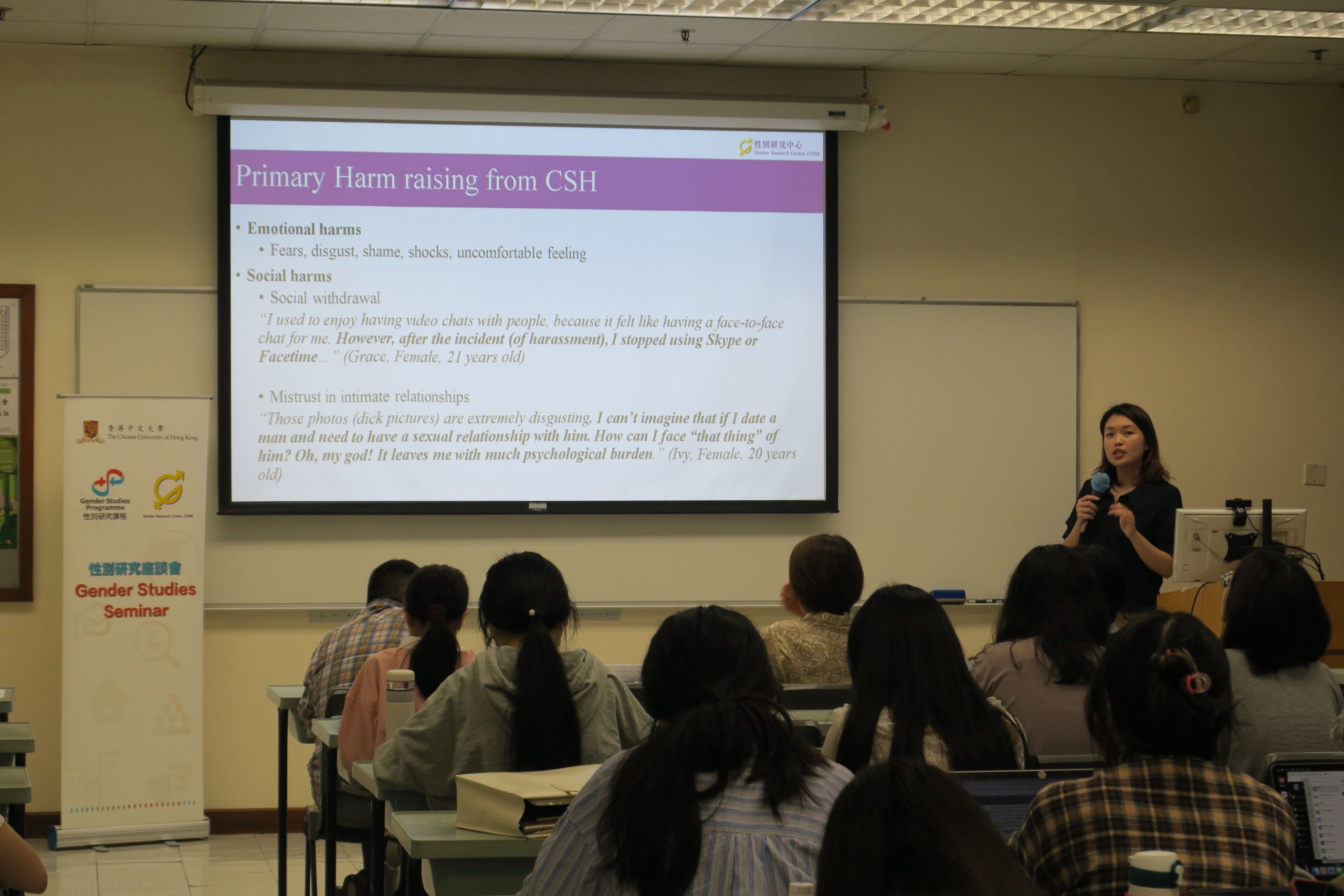The article, Online Sexual Harassment, Harm and Relationality, shared by Dr.Tang Yip and Prof, Susanne Choi Yuk Ping mainly talked about whether different relations provide empowerment or secondary victimization for people who have got online sexual harassment.
Leading with the example of Emma, whose private sex Video was shared without her consent and who then sought for help in many ways and got different outcomes, this article explored why did some relationships produce different outcomes and how did they are produced after disclosure?
Authors recruited interviewees from universities mass mailing platform and a gender research centre’s social media, finally in-depth interviews with 37 young people having different genders, sexual orientations, working status and education levels.
Firstly, online sexual harassment is a pressing issue of sexual violence and globally. And such harassment would bring primary harm, including emotional harms and social harms and emotionally secondary harms.
Then, Disclosing and help-seeking is a complex decision that depends on many factors, such as the type and severity of the harassment, the identity of the harasser, the availability of resources and the relationship with the informal network member. Relationships in this article included that with online platforms, with online forums, with police, with peer, with close friends, with intimate partner and online support group, etc.
Many cases are involved and outcomes varied. In this article, they were divided into three parts, secondary victimization, empowered and ambivalence.
This article presented a culturally relevant framework for relationships that takes relational attributes as a starting point and then categorizes the outcomes they produce into goods and bads, with the former ultimately leading to empowerment and the latter leading to secondary victimization, and intersecting at ambivalence one.
Aside form the knowledge related, it also provided some suggestions about the implications for intervention according to the framework.
撰文: WANG, Junjie
The speakers first used a respondent’s story to reveal Cyber Sexual Harassment as an emergent global problem, which is causing much harm to victims. After summarizing findings from existing studies, they found the gap of offering limited explanations about why some relationships empower and others result in secondary victimization during the process of help-seeking. Thus they wanted to figure out why did some relationships produce positive outcomes and empower victims after their disclosure whereas other relationships result in secondary victimization.
The researchers conducted in-depth interviews with 37 young people in Hong Kong between 2021-2023. The data shows primary harm and secondary harm raising from Cyber Sexual Harassment, which includes emotional harms and social harms, and different outcomes of victims seeking help from police, legal profession, online forums, peer, intimate partner and so on. The researchers built a culturally sensitive relational framework to explain how positive and negative outcomes were produced, that is, different relations with different attributes, for example intimate vs. distant, produce relational goods and relational bads, for example trust and mistrust, which then result in different outcomes, including empowerment and secondary victimization and ambivalence between them.
The research helps acknowledge primary and secondary harm and provides insights for understanding the causes and mechanisms of secondary victimization and further exploring the contexts that shape attributes, mechanisms, and outcomes of different types of relations for disclosure and help-seeking. The research also offers implication for intervention to support those who were victimized by Cyber Sexual Harassment, including creating or increasing access to relations with attributes that produce relational goods, cultivating relational goods and reducing relational bads.
撰文: WANG, Xiaoqing
With the development of technology, the broader concern is how technology will transform gender relationships, but then narrow concern is about the impacts of technology on new forms of sexual violence. Women, men, and the LGBT community are all at risk of being subjects or victims of sexual violence. This topic is about empowerment or secondary victimization, relationality and disclosure of cyber sexual harassment (CSH) . Sexual violence includes unwanted and offensive sexual messages, videos, text or or solicitation. For example, images, text and videos being shared without your consent. It is a problem that occurs frequently across the globe, and women are more likely to be victimized than men, but the percentage of men who are sexually harassed is not small, being 9.8%. However, these data are not representative of the total number of victims, as some victims do not report that they have been sexually harassed out of fear of secondary victimization on the Internet, such as stigmatization. Instead, they tend to seek informal channels to seek help and support from female friends, especially those who have not disclosed their sexual orientation to their families. Compared with sexual harassment committed offline, CSH has some distinctiveness, like the unbounded nature of the virtual world.
The reason why victims turn to a female friend is that families tend to produce
more negative outcomes than female friends. Primary harm raising from CSH includes emotional harms, social harms and emotional secondary harms. Social harms include social withdrawal and mistrust in intimate relationships. Secondary victimization can be caused by many relations, not only formal and informal. Online platforms lack sensitivity and awareness of online sexual harassment, normalize CSH and ignore complains from the victims. For the police, some victims say they don’t trust them because the police may undermine the nature or disability of online sexual harassment. The police also make victims felt disrespected and lack tangible outcomes. The expensive cost and economic barries in taking legal actions discourage victims from taking legal actions. Other reasons like online forums, peer presure and relationship between victim and neighbors can also cause victim’s fear of secondary victimization. When facing this, close friends and intimate partner should trust the victims and give them material and emotional support, also they can provide guiudance on handling online sexual harassment. And in other circumstances, online support group offer a safe and non-judgmental space for victims to speak up.
We should acknowledge primary and secondary harm and understand the causes and mechanisms of secondary victimization. For those who were victimized by CSH, we can create relations with attributes that produce relational goods. They need us to give them respect, trust and equality.
撰文: WANG, Zijie
Cyber Sexual Harassment (CSH) is an emergent global concern, encompassing various forms of online sexual violence such as unwanted sexual advances, unsolicited explicit content, and the non-consensual sharing of sexual messages/images on social media and other online platforms. CSH shares similarities with offline sexual harassment, but it also exhibits distinctiveness. For example, online anonymity enables perpetrators to commit violent acts without revealing their identities. Moreover, the connectivity and longevity of social networking sites (SNS) make CSH a collective and limitless form of victimization. Consequently, the embodied harms of CSH are real, serious, and even more depressing both psychologically and physically.
Many CSH victims opt not to report their experiences or are reluctant to seek help due to concerns about potential secondary victimization, such as blame, stigma, or community reprisal. However, disclosing CSH experiences can also yield positive effects, offering victims a sense of empowerment through mental support. Therefore, it is essential to explore the factors influencing the different outcomes of disclosure. Prof. Susanne Choi Yuk Ping, Dr. Tangi Yip, and their colleagues built a culturally sensitive relational framework from the field of sociology to investigate how relations influence the outcomes of disclosing CSH experiences.
Through in-depth interviews conducted with 37 young people in Hong Kong between 2021 and 2023, the study found that CSH’s primary harms include emotional harms (fear, disgust, shame, discomfort) and social harms (social withdrawal, mistrust
撰文:YU, Mengke





A
A
A
聯絡我們